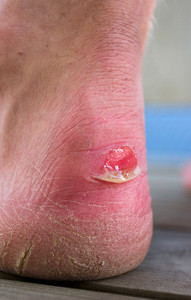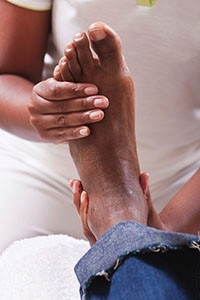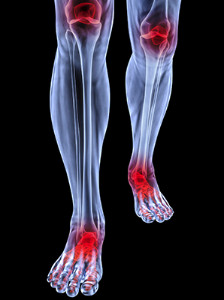
 In a recent study conducted in the Boston area, correlations between obesity, foot pain, and foot disorders were investigated. The sample size of the study was 2445 men and women with an average age of 68. In men, severe obesity, defined as having a body mass index (BMI) of 35 kg/m^2 or more, was found to be associated with foot pain. For women, both moderate (30-34.99) and severe obesity were associated with foot pain. The general conclusion of the study was that regardless of foot posture and dynamic foot function, as one’s BMI increased the likelihood of foot pain increased as well.
In a recent study conducted in the Boston area, correlations between obesity, foot pain, and foot disorders were investigated. The sample size of the study was 2445 men and women with an average age of 68. In men, severe obesity, defined as having a body mass index (BMI) of 35 kg/m^2 or more, was found to be associated with foot pain. For women, both moderate (30-34.99) and severe obesity were associated with foot pain. The general conclusion of the study was that regardless of foot posture and dynamic foot function, as one’s BMI increased the likelihood of foot pain increased as well.
Obesity has become very problematic at this point in time and can have extremely negative effects on the feet. If you’re an obese individual and are concerned about your feet, contact Dr. Russell J. Ellicott from Augusta Foot Center. Dr. Ellicott can provide the care you need to keep you pain-free and on your feet.
Obesity and your Feet
Since your feet are what support your entire weight when standing, any additional weight can result in pain and swelling. Being overweight is one of the main contributors to foot complications.
Problems & Complications
Extra Weight – Even putting on just a few extra pounds could create serious complications for your feet. As your weight increases, your balance and body will shift, creating new stresses on your feet. This uneven weight distribution can cause pain, even while doing the simplest tasks, such as walking.
Diabetes – People who are overweight are at serious risk of developing type-2 diabetes, which has a drastic impact on the health of your feet. As you get older, your diabetes might worsen, which could lead to loss of feeling in your feet, sores, and bruises. You could also become more prone to various infections.
Plantar fasciitis – Pressure and stress that is placed on muscles, joints, and tendons can trigger plantar fasciitis, which is an inflammation of tissue that forms along the bottom of the foot.
If you have any questions please feel free to contact our office located in Augusta, GA. We offer the newest diagnostic and treatment technologies for all your foot and ankle needs.
Read more about How Obesity Affects Your Feet Those who spend a large amount of time putting pressure on their feet are prone to developing blisters, or pockets of fluid between layers of skin which develop due to friction. Minor blisters should not be popped, and instead left alone and covered to provide cushioning and avoid further friction. Prevent the development of blisters by wearing proper-fitting shoes and socks that provide ample comfort and support. Be sure to treat blisters immediately after discovery to avoid pain and disruption of daily activities. If a blister ruptures, immediately disinfect the area and treat it with antibiotic ointment. Consult with a doctor if the pain persists or there is any sign of infection.
Those who spend a large amount of time putting pressure on their feet are prone to developing blisters, or pockets of fluid between layers of skin which develop due to friction. Minor blisters should not be popped, and instead left alone and covered to provide cushioning and avoid further friction. Prevent the development of blisters by wearing proper-fitting shoes and socks that provide ample comfort and support. Be sure to treat blisters immediately after discovery to avoid pain and disruption of daily activities. If a blister ruptures, immediately disinfect the area and treat it with antibiotic ointment. Consult with a doctor if the pain persists or there is any sign of infection.
Blisters are prone to making everyday activities extremely uncomfortable. If your feet are hurting, contact Dr. Russell J. Ellicott of Augusta Foot Center. Dr. Ellicott can provide the care you need to keep you pain-free and on your feet.
Foot Blisters
Foot blisters develop as a result of constantly wearing tight or ill-fitting footwear. This happens due to the constant rubbing from the shoe, which can often lead to pain.
What are Foot Blisters?
A foot blister is a small fluid-filled pocket that forms on the upper-most layer of the skin. Blisters are filled with clear fluid and can lead to blood drainage or pus if the area becomes infected.
How do Blisters Form?
Blisters on the feet are often the result of constant friction of skin and material, usually by shoe rubbing. Walking in sandals, boots, or shoes that don’t fit properly for long periods of time can result in a blister. Having consistent foot moisture and humidity can easily lead to blister formation.
Prevention & Treatment
It is important to properly care for the affected area in order to prevent infection and ease the pain. Do not lance the blister and use a Band-Aid to provide pain relief. Also, be sure to keep your feet dry and wear proper fitting shoes. If you see blood or pus in a blister, seek assistance from a podiatrist.
If you have any questions, please feel free to contact our office located in Augusta, GA. We offer the newest diagnostic and treatment technologies for all your foot care needs.
Read more about Blisters on the Feet If you are experiencing moderate to severe pain in your heel or foot, you may have Plantar Fasciitis. Plantar Fasciitis is an inflammatory condition that affects the heel of the foot, causing in some cases, very extreme pain. There are many causes for this, one being overstretching of the plantar fascia ligament, which runs from the heel to the ball of the foot. This ligament supports the arch and can be affected by both the feet below it, and the muscles above. If the calf muscles are too tight, this can pull on the ligament and cause inflammation. A similar thing happens if you have flat feet. The foot stretches the ligament from below. Other activities that can cause Plantar Fasciitis are standing for long periods of time, running while planting your heel instead of your toe, and constant stress on the plantar fascia ligament. Make sure to stretch your calves, take care that your footwear is not worn out, and seek podiatric treatment if your condition is painful.
If you are experiencing moderate to severe pain in your heel or foot, you may have Plantar Fasciitis. Plantar Fasciitis is an inflammatory condition that affects the heel of the foot, causing in some cases, very extreme pain. There are many causes for this, one being overstretching of the plantar fascia ligament, which runs from the heel to the ball of the foot. This ligament supports the arch and can be affected by both the feet below it, and the muscles above. If the calf muscles are too tight, this can pull on the ligament and cause inflammation. A similar thing happens if you have flat feet. The foot stretches the ligament from below. Other activities that can cause Plantar Fasciitis are standing for long periods of time, running while planting your heel instead of your toe, and constant stress on the plantar fascia ligament. Make sure to stretch your calves, take care that your footwear is not worn out, and seek podiatric treatment if your condition is painful.
Plantar fasciitis can be very painful and inconvenient. If you are experiencing heel pain or symptoms of plantar fasciitis, contact Dr. Russell J. Ellicott from Augusta Foot Center. Dr. Ellicott can provide the care you need to keep you pain-free and on your feet.
What is Plantar Fasciitis?
Plantar fasciitis is the inflammation of the thick band of tissue that runs along the bottom of your foot, known as the plantar fascia, and causes mild to severe heel pain.
What Causes Plantar Fasciitis?
How Can It Be Treated?
While very treatable, plantar fasciitis is definitely not something that should be ignored. Especially in severe cases, speaking to your doctor right away is highly recommended to avoid complications and severe heel pain. Your podiatrist can work with you to provide the appropriate treatment options tailored to your condition.
If you have any questions please feel free to contact our office located in Augusta, GA. We offer the newest diagnostic and treatment technologies for all your foot and ankle needs.
Read more about Plantar Fasciitis Arthritis is a very common disease that can affect joints in areas all over the body. Arthritis of the feet can be especially painful and debilitating due to the constant weight put on that section of the body. For someone with arthritic feet, every step taken can be excruciating. There are many different types of arthritis, though inflammatory arthritis can be one of the most devastating. Rheumatoid arthritis is one such type, where the cartilage of the joints is being destroyed. Though there is really no set diet to cure this illness, there are some recommended foods that may prove effective in helping mitigate some of the arthritic symptoms. The key is to reduce inflammation. Certain foods that help do just that are nuts, fish, and, dark vegetables.
Arthritis is a very common disease that can affect joints in areas all over the body. Arthritis of the feet can be especially painful and debilitating due to the constant weight put on that section of the body. For someone with arthritic feet, every step taken can be excruciating. There are many different types of arthritis, though inflammatory arthritis can be one of the most devastating. Rheumatoid arthritis is one such type, where the cartilage of the joints is being destroyed. Though there is really no set diet to cure this illness, there are some recommended foods that may prove effective in helping mitigate some of the arthritic symptoms. The key is to reduce inflammation. Certain foods that help do just that are nuts, fish, and, dark vegetables.
Arthritis can be a difficult condition to live with. If you are seeking treatment, contact Dr. Russell J. Ellicott from Augusta Foot Center. Dr. Ellicott can provide the care you need to keep you pain-free and on your feet.
Arthritic Foot Care
Arthritis is a joint disorder that involves the inflammation of different joints in your body, such as those in your feet. Arthritis is often caused by a degenerative joint disease and causes mild to severe pain in all affected areas. In addition to this, swelling and stiffness in the affected joints can also be a common symptom of arthritis.
In many cases, wearing ill-fitting shoes can worsen the effects and pain of arthritis. Wearing shoes that have a lower heel and extra room can help your feet feel more comfortable. In cases of rheumatoid arthritis, the arch in your foot may become problematic. Buying shoes with proper arch support that contour to your feet can help immensely.
Alleviating Arthritic Pain
It is best to see your doctor for the treatment that is right for your needs and symptoms. Conditions vary, and a podiatrist can help you determine the right method of care for your feet.
If you have any questions, please feel free to contact our office located in Augusta, GA. We offer the newest diagnostic tools and technology to treat your foot and ankle needs.
Read more about Arthritic Foot Care